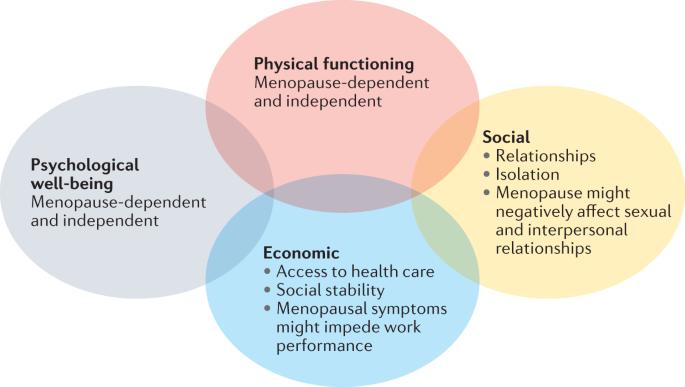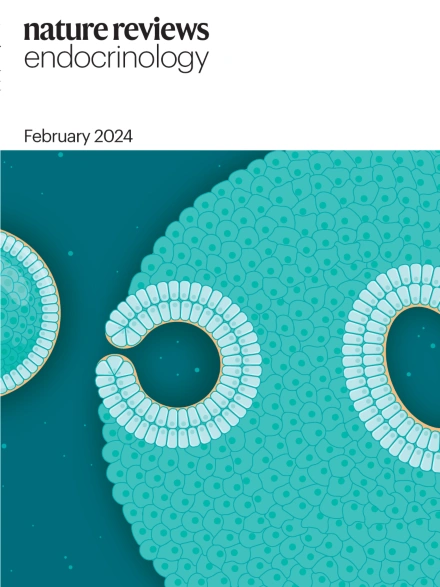Treating menopause — MHT and beyond
IF 40
1区 医学
Q1 ENDOCRINOLOGY & METABOLISM
引用次数: 23
Abstract
Every woman who lives past midlife will experience menopause, which, by definition, is complete cessation of ovarian function. This process might occur spontaneously (natural menopause) or be iatrogenic (secondary menopause), and can be further classified as ‘early’ if it occurs before the age of 45 years and ‘premature’ if it occurs before the age of 40 years. Globally, the mean age of natural menopause is 48.8 years, with remarkably little geographic variation. A woman’s age at menopause influences health outcomes in later life. Early menopause is associated with a reduced risk of breast cancer, but increased risks of premature osteoporosis, cardiovascular disease and premature death. The cardinal symptoms of menopause, and adverse health sequelae, are due to loss of ovarian oestrogen production. Consequently, menopausal hormone therapy (MHT) that includes oestrogen or an oestrogenic compound ameliorates menopausal symptoms, while preventing menopause-associated bone loss and cardiometabolic changes. Importantly, comprehensive care of postmenopausal women involves lifestyle optimization (attention to nutrition and physical activity, reducing alcohol consumption and not smoking) and treating other established chronic disease risk factors. This Review offers a commentary specifically on the contemporary use of MHT and novel pharmaceutical alternatives to manage menopausal symptoms. Menopause affects roughly half of the global population, yet many affected people do not receive the treatment they need. This Review discusses currently available menopausal hormonal therapies and novel pharmaceutical alternatives to manage menopausal symptoms.

治疗更年期--MHT 及其他
每个过了中年的女性都会经历更年期,顾名思义,更年期就是卵巢功能完全停止。这一过程可能是自发的(自然绝经),也可能是人为的(继发性绝经),如果在 45 岁之前绝经,可进一步分为 "早期绝经",如果在 40 岁之前绝经,可进一步分为 "过早绝经"。全球自然绝经的平均年龄为 48.8 岁,地域差异极小。妇女的绝经年龄会影响其晚年的健康状况。过早绝经会降低罹患乳腺癌的风险,但会增加过早患骨质疏松症、心血管疾病和过早死亡的风险。更年期的主要症状和不良健康后遗症都是由于卵巢雌激素分泌减少所致。因此,包括雌激素或雌激素化合物在内的更年期激素疗法(MHT)可改善更年期症状,同时预防与更年期相关的骨质流失和心脏代谢变化。重要的是,对绝经后妇女的全面护理包括优化生活方式(注意营养和体育锻炼、减少饮酒和不吸烟)以及治疗其他已确定的慢性疾病风险因素。本综述特别对当代使用 MHT 和新型药物替代品来控制更年期症状进行了评论。更年期影响着全球大约一半的人口,但许多更年期患者并没有得到所需的治疗。本综述讨论了目前可用来控制更年期症状的更年期激素疗法和新型替代药物。
本文章由计算机程序翻译,如有差异,请以英文原文为准。
求助全文
约1分钟内获得全文
求助全文
来源期刊

Nature Reviews Endocrinology
医学-内分泌学与代谢
CiteScore
42.00
自引率
0.70%
发文量
158
审稿时长
6-12 weeks
期刊介绍:
Nature Reviews Endocrinology aspires to be the foremost platform for reviews and commentaries catering to the scientific communities it serves. The journal aims to publish articles characterized by authority, accessibility, and clarity, enhanced with easily understandable figures, tables, and other visual aids. The goal is to offer an unparalleled service to authors, referees, and readers, striving to maximize the usefulness and impact of each article. Nature Reviews Endocrinology publishes Research Highlights, Comments, News & Views, Reviews, Consensus Statements, and Perspectives relevant to researchers and clinicians in the fields of endocrinology and metabolism. Its broad scope ensures that the work it publishes reaches the widest possible audience.
 求助内容:
求助内容: 应助结果提醒方式:
应助结果提醒方式:


